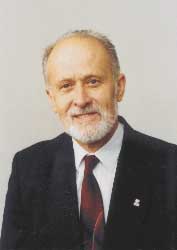August Chełkowski
| August Chełkowski | |
|---|---|
 |
|
|
Marshal of the Senate 2nd Marshal of the Senate of The Third Republic of Poland |
|
|
In office December 23, 1991 – October 15, 1993 |
|
| President | Lech Wałęsa |
| Prime Minister | Jan Olszewski, Waldemar Pawlak, Hanna Suchocka |
| Preceded by | Andrzej Stelmachowski |
| Succeeded by | Adam Struzik |
| Personal details | |
| Born | February 27, 1927 Telkwice, then East Prussia, German Reich, now Poland |
| Died | October 31, 1999 (aged 72) Warsaw, Poland |
| Political party | Solidarity |
| Profession | Physicist |
August Chełkowski (Polish pronunciation: [ˈauɡust xɛwˈkɔfskʲi], February 27, 1927 – October 31, 1999) was a prominent Polish physicist and politician.
Born in the small village of Telkwice, then in East Prussia (then a part of Weimar Republic) he was a son of Franciszek Chełkowski, a wealthy landowner and prominent activist of the Polish community in Prussia and his wife Emilia (maiden name Mieczkowska). He was related to a number of other Polish activists by his maternal side.
He was a 1948 graduate of the prestigious Karol Marcinkowski Lycee in Poznań (commonly known as Marcinek) and Adam Mickiewicz University in Poznań. He earned his MSc degree (magister) in physics in 1952 and his PhD (doktorat) in 1958.
Although he was a Poznanian, he relocated permanently to Katowice in 1967, together with a number of other scientists from Poznan. In 1968, when the University of Silesia was established, Chelkowski, along with other scientists from Poznan, established that University's Physics Institute, which was named after him in 2000.
He went to become a professor of the University of Silesia in Katowice in 1973 and a higher ranking professor (professor zwyczajny) in 1990.
He served as the Rector of the University of Silesia in Katowice from September 1, 1981 until January 12, 1982, when he was dismissed by the then minister of higher education for political reasons.
He was an author of a number of works on physics.
In 1980 he became a member of the Solidarity and an active figure of the opposition. He was the only president of any Polish university to be arrested during the Martial Law.
After the fall of communism, he was elected to the Senate from the Solidarity list and served until his death.
...
Wikipedia
